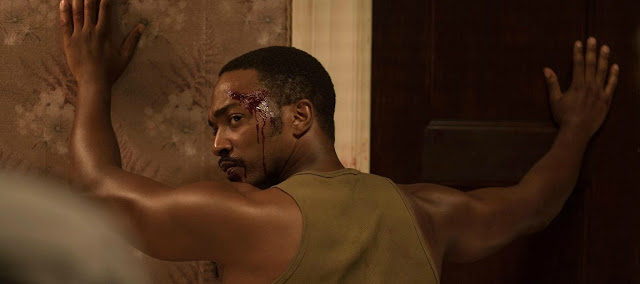If there's any film out there that's made all the more impactful and relevant by the current political climate, it's Detroit. At a time when racial tension in America is running higher and higher, this film transports us back to Detroit in 1967, in the midst of the riots that were tearing the city apart. The event that the film zeroes in on is the incident at the Algiers Motel, a particularly harrowing night that ended with the deaths of three young men. Above all else, Detroit perfectly portrays how incidents like these can be an unfortunate symptom of a larger societal problem.
What Detroit manages to capture above all else is chaos. From the first scene of a riot breaking out, the action is constant and kinetic. The environment that's built up across the first act almost feels like a post-apocalyptic wasteland, so the heightened tension among the police is understandable. Racism does have a large part to play in the story, but the film is wise enough to not make every police character a racist caricature (just one of them). The film also manages to bring a level of humanity to a situation that ran on pure rage, and grounds every character in a believable way. Even the antagonistic police officers are given some degree of humanity, although never enough to garner any real sympathy.
The film's greatest strength is also its greatest weakness. In an attempt to keep the chaotic feeling intact throughout the film, a lot of shaky-cam is employed. This is a filmmaking technique I've never liked, and while it can be used effectively, it's a tad overused here. The handheld cinematography is very fitting, but they just needed to rein in the shaking and zooming a bit. Surprisingly, despite the film's run-time, it never drags. Not a single moment feels wasted, and for as long as the main sequence inside the hotel goes on, it never lets up.
The sequence inside the Algiers is reason enough to see this movie; it's a masterpiece of tension. But Detroit also has to deal with two very different tones. For as much of a downer as this film is, they did add some levity in there. These lighter scenes follow the singing group The Dramatics, as their lead singer Larry (Algee Smith), gets caught in the Algiers Motel while waiting for a riot to die down. The other main protagonist is Melvin Dismukes (John Boyega), who gets caught up in the Algiers incident completely by accident, and his role is the most relevant to the themes of oppression and of humanity. The stand-out performance comes from Will Poulter, as the primary antagonist, Officer Krauss. Poulter - who undeniably still looks like a teenager - expertly balances both rage and fear, and he crafts a character that's very easy to hate.
Obviously, this is a film that can't be discussed without bringing up the political and racial layers of the story, and I think that - for the most part - it's all executed very intelligently. While some of the actions of the police officers are reprehensible, you understand why they do it. Not every police officer is a racist monster; many of them are just trying to keep order in a city that's falling apart. The civilians are mostly just caught in the crossfire, and the tension that arises is a result of the situation around the Algiers incident, not just hatred. Unfortunately, while the racism is handled with a lot of nuance, there are moments where it just becomes blatant. Like the shaky-cam, if they'd just reined it in, it would have been much better, and much more effective.
Detroit is undeniably an very competent film, but I hesitate to call it a great one. It's like War for the Planet of the Apes; it doesn't do anything wrong, there aren't any glaring flaws, it just isn't a film I would count among my favourites of the year. It excels at what it does, but the tonal jumps, obnoxious camerawork, and moments of overt racism just didn't quite work for me. Still, this is a film that's definitely worth seeing, and one that carries a lot of relevance. It's a film abut mistakes on both sides, and the extremes that people are pushed to, or those that they push themselves to. In the end, there's not a lot of justice to be found, but that's how it was in 1967. That truth is painful, but it's the truth. This film doesn't dramatise or glamorise death and pain; it just forces you to confront them head-on.


Comments
Post a Comment